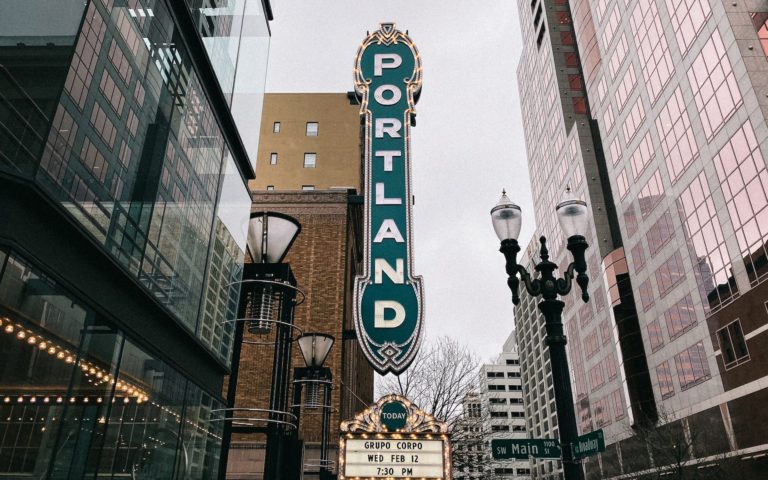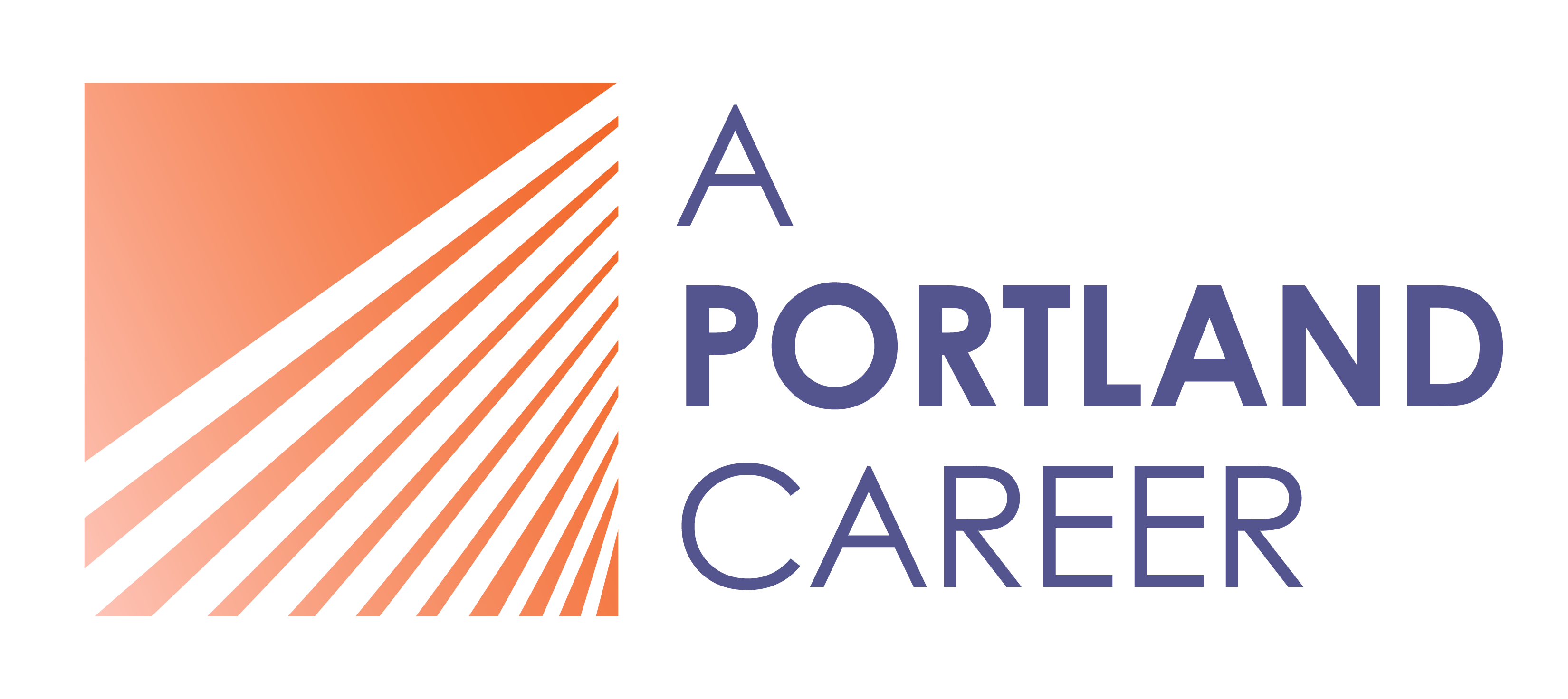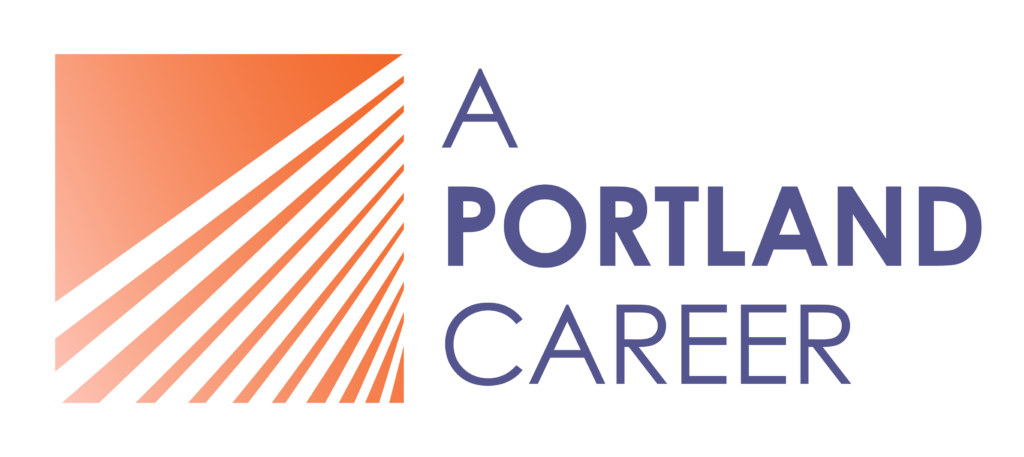Learn how to use job boards in Portland and beyond to find job listings that match your criteria for your ideal local or remote job!
Learn different ways to approach a creative career and make a living as an artist in Portland, Oregon.
How to Find Jobs for Creatives in Portland, Oregon
By A Portland Career, and edited by JD Duran
Thinking about a creative career? Talk to us, and let’s see if this path is right for you

“He who walks out of step hears a different drum.” – Ken Kesey
In May 2012, The Wall Street Journal broached the possibility that Portland may become the country’s next art capital: “In what U.S. city might you find an ‘alternative’ art exhibition space on a 200-ton, 135-foot decommissioned crabbing ship?” While Hollywood pokes fun at us in zany skits on Portlandia, the reality is that Portland really is a quirky hotbed of creativity for those pursuing paths in the fine arts or creative industry worlds.
In this post, we’ll take a look at the career implications of both paths and what types of jobs are available for creative job seekers and artists in Portland.
Home → Helpful Articles → Job Search → How to Find Jobs for Creatives in Portland, Oregon
We’ve got a ton of articles about how to navigate your best job search. Here are a few you might find helpful:
- The Best Job Boards in Portland OR and Beyond, and How to Use Them
- How to Create Your Own Internship
- How To Recruit Recruiters with Your LinkedIn Profile
- The 6 Best Social Media Platforms for Job Seekers — and How To Use Them
- How to Avoid These 6 Job Search Procrastination Triggers
- How to Choose a Company to Work For to Level-Up Your Career Satisfaction
If you’re feeling stuck, reach out, and we’ll customize a job search to match where you’re at in the process.

Challenges for PDX-based creatives
Portland’s fine arts and creative scenes are robust for people living modestly; lucky enough to enjoy a secure second income; or savvy enough to seek the right opportunities and poise themselves skillfully through networking, personal branding, and focus.
While it’s true that we have only one wealthy art patron (Arlene Schnitzer), creative people can make opportunities for themselves in Portland if they are determined, able to find a market for their work, and are willing to pay their dues.
For those who need a salaried position with benefits, there are several creative agencies in Portland with the need for creative skill sets like writing, illustration, photography, and design.
While the cost of living in Portland isn’t as attractive as it once was, prices in Portland still pale in comparison to San Francisco, Los Angeles, or Seattle for those pursuing a life in the arts or a job in the creative industry.
Your financial options depend on whether you’re pursuing a path in the fine arts or in the creative services industry—as these two paths offer wildly different opportunities and salary potential. Now, let’s take a look at each path and their career implications.

Pursuing a career in the fine arts
The term “fine arts” focuses on art forms developed primarily for aesthetics and/or concept, rather than practical application. Historically, the great fine arts have included painting, sculpture, architecture, and poetry, with music, drama, and dancing considered “performing arts.” While the focus of these art forms is not primarily practical, the artists themselves have to solve the very practical problem of supporting themselves. Few full-time, paid employment opportunities, like playing with the Portland symphony, exist.
Most local fine and performing artists grapple with compromises and select one, or several, of the following to support themselves as they pursue their artistic callings.
Teaching a fine arts subject in universities or schools
This option is attractive because the schedule offers generous vacation allotments and support for continuing to develop your medium. A Masters in Fine Arts (MFA) is the terminal degree required for a full-time teaching position in studio arts at a community college or four-year university.
Most courses, particularly at community colleges, are taught by part-time, temporary “adjunct faculty.” Contracts to teach individual courses are plentiful at the five community college campuses in or near Portland, as well as at PSU and private colleges. The downsides of being an adjunct faculty include poor pay, unpredictable schedules, and slow-accumulation of benefits.
Administrative work in an arts organizations
Working in an arts organization is inspiring to some artists because it allows them to be immersed in the arts, even if their job function is program management, education, fundraising, or directing. It’s also a great way for artists to monetize their other skills.
Portland’s arts organizations are financially supported through a mix of paying attendees, patrons, private foundations, and government funding. For example, with help from small National Arts Endowment (NEA) grants, the following organizations have paid staff positions: Literary Arts Inc., Miracle Theater Group, Portland Center Stage, Portland Youth Philharmonic Association, and White Bird (dance).
Working part-time in an unrelated field
Start up a conversation with many young baristas or bartenders and usually you will find a musician, writer, or other type of artist that’s only in it for the steady paycheck to support their art.
While writing his first short stories and novels, Ernest Hemingway worked for stretches of time as a reporter, and then lived cheaply on his money while supporting his first wife and child. Temporary creative staffing agencies, such as Mathys+Petestio or 52 Limited can provide another source of short- or long-term cash flow and flexibility.
Landing a grant to support your art full-time
Getting a grant is a great way to support your art while giving you freedom from non-artistic employment and flexibility in your schedule.
In her book The Artist’s Guide to Grant Writing, local writer and presentation coach Gigi Rosenberg illuminates the business side of being an artist and outlines a strategy to “transform readers from starving artists fumbling to get by into working artists who confidently tap into all the resources at their disposal.” Written in an engaging, down-to-earth tone, this comprehensive guide includes time-tested strategies, anecdotes from successful grant writers, and tips from grant officers and fundraising specialists.

Pursuing a career in the creative services industry
The creative services industry refers to a range of economic activities concerned with the generation development of knowledge, information, and ideas. These creatives work in advertising, digital marketing, public relations, architecture, illustration, fashion, film, publishing, software, video games, TV and radio, and print and web design.
To garner full-time employment in the creative industry as a copywriter, illustrator, photographer, videographer, or web/print graphic designer, it’s usually necessary to have a well-developed, high quality online portfolio. While some pieces can be from student projects, others need to be from clients. To develop their portfolios, many creatives begin as freelancers and then move to agencies or in-house positions.
Industry creatives in Portland have lots of employment options, which in general tend to offer higher salaries than their fine arts counterparts.
Freelance or contract creative work
Freelancers enjoy flexible schedules, the ability to be location-independent, and the luxury of not having to commute to downtown PDX from Beaverton, Vancouver, or Hillsboro.
Freelance creatives find their own clients (or use a creative staffing agency), often keeping a second part-time job while building a business and portfolio.
On the other hand, they have to be able to handle the often “feast-or-famine” nature of the job (times when you’re busy and making lots of money and times where you have no work at all), and the lack of team members to collaborate with (though that is a plus for all the introverted creatives out there).
A proclivity for technology and/or an entrepreneurial spirit are correlated significantly with freelancer success. Most creatives need to develop a specific niche to compete in Portland’s robust freelance scene; like architectural photography, cannabis writing, or dissertation editing.
Creative and digital marketing agencies
Portland has hundreds of small agencies, mainly located in Northwest Portland and the Pearl. In addition, it has two large agencies: Waggener Edstrom, an international public relations firm; and Weiden+Kennedy, the dazzling creative agency behind iconic ad campaigns for Nike and Levi’s. Agencies provide fast-paced environments, creative teams, and the occasional breakneck deadline. The pay and benefits are generally good at these agencies, but the field is highly competitive–even at the entry level.
There are dozens of different job types in the creative industry, with a long list of job titles that includes:
- art director
- associate creative director
- project manager
- product manager
- account manager
- copywriter
- graphic designer
- production designer
- marketing specialist
- social media manager
- content writer
- UX designer
Creative staffing/temp agencies
Creative staffing agencies provide temporary projects for creatives, and their recruiters generally look for people with a few years of experience, or at the very least a somewhat developed portfolio of work. The ideal candidate for this avenue is someone wanting to find a job in the creative field fast—as the agency is essentially a middleman who matches your profile with the needs of a host of companies they’re partnered with.
Some of the most active creative staffing agencies in Portland are:
- Mathys+Potestio
- 52 Limited: Tech and Creative
- Aquent
In-house creative departments
Large companies, educational organizations, medical facilities, and government agencies usually have in-house creative departments.
Companies with local corporate headquarters, such as Norm Thompson and Nike, have teams of graphic designers, marketing coordinators, copywriters, and photographers who create their catalogs, packaging, promotional materials, communications, trade show booths, and the like. Because these positions are highly competitive and often require technical skills, it is vital to build technological competence and stay current with industry trends to compete for these popular positions. It also helps to have an inside connection, so polish your networking skills, too.
Nonprofits
Illustrious non-profits, such as Mercy Corps or the Humane Society, are particularly competitive because they combine social contribution with creativity. Unless you are well-networked, you may need to take a minimally paid or unpaid internship with such a desirable employer. We suggest you initially build your credentials with a less prominent organization that has a similar mission. Keep your eye on your network. As you grow your experience, watch for opportunities to meet people at the organizations you have in your sights.
Final thoughts on finding a creative career in Portland, Oregon
If you’re a creative type unsure of how to both make a living and pursue your art, don’t panic—you have more options than the “starving artist” stereotype would have you think. Whether you want to pursue your art full-time or apply your creative skills in the business world, there are several avenues you can pursue to find a balance between satisfying your financial and artistic needs.
Key takeaways
- Before you start looking for jobs, decide whether you want to pursue a path in the fine arts or in the creative services industry
- Working an administrative job within an arts organization is a great way to stay immersed in the arts while using and monetizing administrative skills like project management or bookkeeping
- The creative services industry offers a wide spectrum of opportunities, from freelancing to well-paid creative positions for agencies or in-house at larger companies
- To get started in the creative services industry, you’ll typically need some sort of portfolio or visual resume for your work
- Creative staffing agencies are a great way to find temporary projects to work on or short-term employment as you look for something more stable
Related articles you might be interested in:
The Best-Kept Secrets For How to Find Your Next Job and Get Hired Using Twitter
Advance your career with these best-kept secrets on using Twitter for job search to help you find and land your next job.
How To Recruit Recruiters with Your LinkedIn Profile
Jumpstart your networking efforts with these 11 expert tips to create a LinkedIn profile that really stands out.
How to Avoid These 6 Job Search Procrastination Triggers
Learn how to avoid these six job search procrastination pitfalls with expert tips and advice from our career counseling team.





